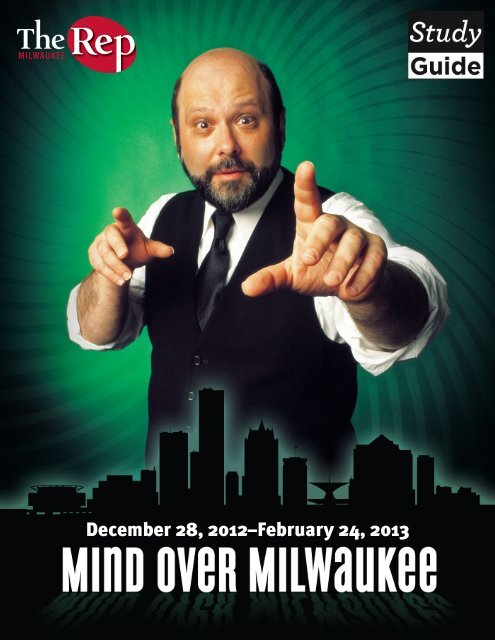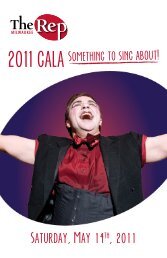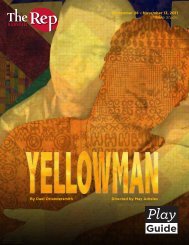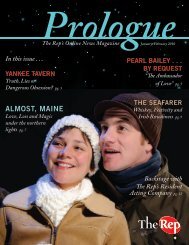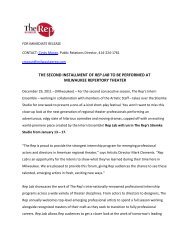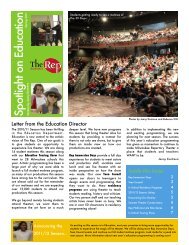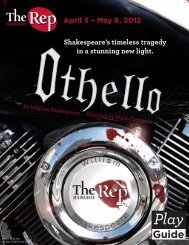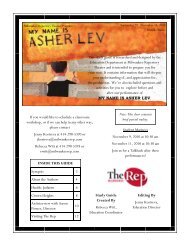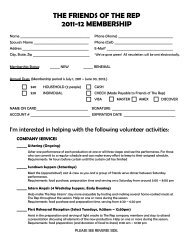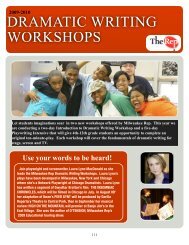Download/Print (.pdf) - Milwaukee Repertory Theater
Download/Print (.pdf) - Milwaukee Repertory Theater
Download/Print (.pdf) - Milwaukee Repertory Theater
Create successful ePaper yourself
Turn your PDF publications into a flip-book with our unique Google optimized e-Paper software.
December 28, 2012–February 24, 2013
MIND OVER MILWAUKEE<br />
STUDY GUIDE<br />
•<br />
Written by<br />
Lindsey Schmeltzer<br />
Education Intern<br />
•<br />
With contributions from<br />
Mind Games You Can Play<br />
by Marc Salem<br />
•<br />
Study Guide edited by<br />
Jenny Kostreva<br />
Education Director<br />
Leda Hoffmann<br />
Education Coordinator<br />
JC Clementz<br />
Literary Assistant<br />
Lisa Fulton<br />
Director of Marketing<br />
•<br />
Graphic Design by<br />
Eric Reda<br />
Tickets: 414-224-9490<br />
www.<strong>Milwaukee</strong>Rep.com<br />
Mark Clements<br />
Artistic Director<br />
Dawn Helsing Wolters<br />
Managing Director<br />
<strong>Milwaukee</strong> <strong>Repertory</strong> <strong>Theater</strong><br />
108 E. Wells Street<br />
<strong>Milwaukee</strong>, WI • 53202<br />
<strong>Milwaukee</strong> <strong>Repertory</strong><br />
<strong>Theater</strong> presents<br />
By Marc Salem<br />
December 28, 2012-February 24, 2013<br />
Stackner Cabaret<br />
MARK’S TAKE:<br />
“How to describe brilliant, witty<br />
mentalist Marc Salem and Mind Over<br />
<strong>Milwaukee</strong>? It’s not a play, it’s not a<br />
musical, and it’s certainly not a magic<br />
act. So let’s call it an entertainment,<br />
tailor- made for a <strong>Milwaukee</strong> audience.<br />
Jaws will drop as Marc separates truth<br />
from lies in increasingly amazing<br />
ways—and the audience wonders,<br />
‘How did he do that?!’”<br />
-Mark Clements, Artistic Director<br />
TABLE OF CONTENTS<br />
Page 3 Biography<br />
Page 4 Mentalism<br />
Page 5 Techniques<br />
Page 6 Activities<br />
Page 7 Interview with<br />
Marc Salem<br />
Page 8 Visiting The Rep
Born and raised in Philadelphia, mentalist Marc Salem has<br />
studied the human mind for over thirty years and is considered<br />
to be a leading authority on non-verbal communication. Salem<br />
received a Doctorate in Education from New York University, as<br />
well as a Ph.D. in Developmental Psychology from the University<br />
of Pennsylvania. Salem served on the faculty of several major<br />
universities over two decades. While serving as the Director of<br />
Research at Children’s Television Workshop (Sesame Street),<br />
Salem studied the nature and development of the mental process<br />
for over nine years.<br />
Mind Games, Salem’s one man show, combines mentalism with<br />
comedy. Performed on Broadway, as well as at the Sydney Opera<br />
House, the Edinburgh Festival, and Singapore’s Esplanade, Mind<br />
Games achieved both critical and popular acclaim as Marc Salem<br />
traveled the world exploring the mind’s potential.<br />
Marc Salem<br />
Working as a public speaker, Salem continues to educate lawyers, politicians, and<br />
public servants on the minute nuances of voice and movement that reveal a person’s<br />
thoughts on those around them. Salem has also worked with the FBI on high profile<br />
cases using his abilities to spot people lying.<br />
Salem completed three sell-out seasons in London and two network television specials.<br />
He is a regular guest on Court TV and can be seen on The O’Reilly Factor, Kelly and<br />
Michael, Montel, Maury, and CNN. Salem has also been profiled in the New York Times,<br />
as well as on 60 Minutes by Mike Wallace.<br />
Find more on Marc Salem at:<br />
www.MarcSalem.com<br />
Marc Salem’s Mind<br />
Games: A Practical<br />
Step-by-step Guide<br />
to Developing Your<br />
Mental Powers<br />
BIOGRAPHY<br />
Read Marc Salem’s blog in Men’s Health:<br />
http://blogs.menshealth.com/mind-games/<br />
FIND OUT MORE: Instructional Books by Marc Salem<br />
The Six Keys to Unlock and<br />
Empower Your Mind: Spot<br />
Liars & Cheats, Negotiate<br />
Any Deal to Your Advantage,<br />
Win at the Office, Influence<br />
Friends, & Much More<br />
www.<strong>Milwaukee</strong>Rep.com • pg 3
MENTALISM<br />
Girolama Scotto<br />
HISTORY<br />
In psychology, mentalism refers to the study of mental perception and<br />
thought processes, or consciousness. Mentalist performances can<br />
be traced back to ancient Greece, with accounts of seers and oracles.<br />
Entertainment in the 19th Century included mediums, spiritualists,<br />
and psychics, early forms of mentalists. Today mentalism is a<br />
performance art, where a person, known as a mentalist, demonstrates<br />
highly developed intuitive and mental abilities. A mentalist’s skill<br />
set may include clairvoyance (demonstrating intuitive knowledge<br />
of objects or people), telepathy (hearing a person’s thoughts, or<br />
reading a person’s memories), divination (predicting future events),<br />
mediumship (communicating with spirits of the dead), psychokinesis<br />
(the ability to move objects with your mind), and mind control. Sources<br />
credit Girolamo Scotto, a pioneering sleight-of-hand magician with<br />
performing the earliest recorded mentalist act in 1572.<br />
MENTALIST OR MAGICIAN?<br />
Many mentalists do not associate themselves with magic, but<br />
presentation styles can vary greatly from performer to performer. Most<br />
consider mentalism to be another art form altogether, which relies on<br />
the mind to perform the “tricks” as opposed to slight-of-hand or illusion.<br />
Although some mentalists claim to have supernatural powers, many<br />
contemporary performers attribute their skills to the ability to read<br />
body language or the manipulation of their participants subconsciously<br />
through psychological suggestion. Today some magicians add elements<br />
of mentalism into their magic acts. Such a stunt might include reading<br />
a person’s mind while magically trading the positions of two objects.<br />
Some notable magicians that mix magic and mentalism include David<br />
Copperfield, David Blaine, and Criss Angel.<br />
NOTABLE MENTALISTS<br />
Erik Jan Hanussen<br />
A 1930’s German mentalist,<br />
Hanussen is credited with<br />
predicting the Reichstage<br />
fire. Some even claim<br />
he hypnotized arsonist<br />
Marinus vander Lubbe.<br />
Grigori Rasputin<br />
A 1900’s Russian visionary<br />
and mystic, Rasputin was<br />
said to have holy powers,<br />
and heavily influenced<br />
Tsarina Alexandra’s<br />
government decisions<br />
David Copperfield<br />
Wolf Messing<br />
A 1940’s psychic and<br />
telepathist, Messing’s<br />
predictions of the outcome<br />
of WWII, influenced Joseph<br />
Stalin’s decision to sign the<br />
Nazi-Soviet Pact.<br />
Count Alessandro Di<br />
Cagliostro<br />
A 1780’s physician to<br />
Benjamin Franklin, he<br />
influenced members of the<br />
French aristocracy.<br />
Mind Over <strong>Milwaukee</strong> Study Guide • pg 4
PHYSICIAL CUES USED BY MENTALISTS<br />
TECHNIQUES<br />
NON-VERBAL COMMUNICATION (Excerpt from Marc Salem’s Mind Games You Can Play)<br />
Is your mind warmed up and ready for some new ideas? Try this one: think about how much<br />
you communicate without words. Imagine a conversation. You use words to communicate, but<br />
what else do you use? How do your facial expressions show what you mean? Your gestures?<br />
Your posture? How close you stand to someone? How about the way you say your words:<br />
your intonations, volume, rhythm? According to A. Barbour’s Louder Than Words: Non-Verbal<br />
Communication, verbal communication comprises only a small part of how we relate to each<br />
other. Here is how Barbour breaks down communication:<br />
7% Verbal –Words<br />
38% Vocal –Volume, Intonation, Rhythm, Etc<br />
55% Body Language –Facial Expressions, Posture, Gesture, Etc.<br />
ARMS CROSSED<br />
Crossing your arms closes off<br />
your body and is seen as a<br />
defensive posture. It can also<br />
mean that you are closed off<br />
to new ideas.<br />
DILATED PUPILS<br />
Your pupils become dilated<br />
when you see a person or<br />
thing that is attractive to<br />
you. Dilated pupils are also<br />
seen as attractive by others.<br />
FEET CROSSED<br />
Crossing your feet or<br />
legs is a sign of being<br />
comfortable or relaxed<br />
with a person or<br />
circumstance.<br />
TOUCHING NECK<br />
Touching your neck is<br />
a nervous habit that<br />
may be seen as trying<br />
to hide the truth.<br />
LEANING FORWARD<br />
Leaning forward is seen as an<br />
act of anger or aggression,<br />
especially if it is done quickly<br />
with other aggressive signals<br />
such as angry facial expressions.<br />
FORMS OF MENTALISM<br />
Mentalists perform “readings” on members of their audience. They may reveal memories from<br />
the past, issues you are dealing with in your life, or predictions for your future. Here are some<br />
techniques mentalists use in readings:<br />
Cold Reading<br />
A technique that uses cues from of person’s body language, clothes, and speech. The mentalist<br />
will have a higher probability of guessing a person’s background correctly.<br />
Hot Reading<br />
Requires that the mentalist has some background information on the person, either from a<br />
previous conversation or a helper. The mentalist will make it appear that they did not have this<br />
previous knowledge.<br />
Forer Effect<br />
Developed by psychologist Bertram R. Forer, vague and generalized statements make a person<br />
feel like the reading is specifically tailored to them. Mentalists use this technique in fortune<br />
telling and horoscopes.<br />
(*Excerpt from Marc Salem’s Mind Games You Can Play)<br />
www.<strong>Milwaukee</strong>Rep.com • pg 5
ACTIVITIES<br />
Make your own pendulum, grab a deck of cards, and try out some<br />
of these activities from Marc Salem’s Mind Games You Can Play.<br />
THE PENDULUM BASICS<br />
Hold the pendulum between your thumb and index finger. Suspending<br />
the pendulum about two inches above the middle of the circle, rest<br />
your elbow on the table, or whatever surface you are using. Take<br />
some slow, deep breaths, then breathe normally and relax your mind.<br />
Think of the “YES” direction (i.e. up and down). It may take a few<br />
seconds or even a minute, but the pendulum will start moving up<br />
and down, as if you were nodding your head signifying “Yes”.<br />
Now concentrate on the “NO” direction (i.e. side to side). Concentrate<br />
as hard as you can. The pendulum will start moving from side to side.<br />
Concentrate on the “NOT SURE” direction (i.e. a circle), and watch<br />
the pendulum revolve in a circular motion.<br />
The key is to focus.<br />
NO<br />
YES<br />
NOT SURE<br />
RED OR BLACK<br />
This is a test of your clairvoyant powers. Clairvoyance is a French word that means ‘Clear-<br />
Seeing’. It is sensing something of which there is no ordinary way to know. For example, if you<br />
shuffled a deck of cards, pulled one out, did not show it to anyone, and then predicted what<br />
card it was, that is clairvoyance.<br />
Take a deck of cards and mix them thoroughly, keeping them face down. Take the top card (face<br />
down) and try to sense if it is a black card or a red one. Try to picture, or feel, the color. If you<br />
think it is red, place it in a separate pile on your left, face down. If you think it is black, place it in<br />
a separate pile on your right, face down. Take the next card and try to sense the color. Continue<br />
this procedure until you’ve gone through the entire deck. You can go as fast or as slow as you<br />
wish. The important thing is to go with your first gut feeling. Do not change your mind.<br />
When you have gone through the entire 52 cards, turn the two piles over. Count how many<br />
red cards are in the pile you thought were red. Count how many black cards are in the pile you<br />
thought were black.<br />
Cards correct in each pile:<br />
12-14—Average<br />
15-20—Excellent<br />
Over 20—Extraordinary<br />
Excerpt from Marc Salem’s<br />
Mind Games You Can Play<br />
Excerpt from Marc Salem’s<br />
Mind Games You Can Play<br />
Mind Over <strong>Milwaukee</strong> Study Guide • pg 6
INTERVIEW WITH MARC SALEM<br />
What exactly is a mentalist?<br />
Well, the word itself is somewhat archaic. I like to<br />
think of playing mind games. Both as a psychologist<br />
and an entertainer, the mind is the playground that<br />
I enjoy spending my time in.<br />
And is that why you decided to become a<br />
mentalist, or what drew you to it?<br />
The mind has always fascinated me, the way things<br />
effect the mind has always influenced me. I worked<br />
on the surgeon generals’ studies of the effects of<br />
violence on television; I was with Sesame Street for<br />
ten years studying how the mind works, and how it<br />
takes in information. So, I was a psychologist first,<br />
and a mentalist second.<br />
Where has this job taken you?<br />
South Africa, Sydney Opera House, England many,<br />
many times…places that as a university professor, I<br />
never thought I would get to.<br />
Mind Over <strong>Milwaukee</strong> is geared towards<br />
<strong>Milwaukee</strong>ans. What kind of preparation or<br />
research did you do to prepare for this show?<br />
I spent some time here a few months ago to get<br />
a sense of the people, of the place, the way they<br />
think, the source of their own thoughts, locales,<br />
and things that I have integrated ultimately into the<br />
show. Everything from football teams to the things<br />
that people imbibe.<br />
How did you all come up with the design<br />
concept for this show? The study or library<br />
type look. Did you have any say in that?<br />
I always want my set to look like a living room.<br />
The point of the show is that you are welcome into<br />
my home. I always had a living room set, it is an<br />
extension, and it is to make people feel comfortable.<br />
It is not a distant, flashy, Vegas sort of thing, but it is<br />
just a comfortable, warm place that is intentionally<br />
designed to look that way.<br />
What do you hope people walk away with<br />
after seeing your show?<br />
Well, in addition to a smile, hopefully they say<br />
that, “there is something else out there that I do<br />
not see,” and they become more aware of things<br />
around them.<br />
www.<strong>Milwaukee</strong>Rep.com • • pg pg 7<br />
11
<strong>Milwaukee</strong> <strong>Repertory</strong> <strong>Theater</strong>.<br />
VISITING THE REP<br />
<strong>Milwaukee</strong> <strong>Repertory</strong> <strong>Theater</strong>’s Patty and Jay Baker <strong>Theater</strong> Complex is located in the <strong>Milwaukee</strong> Center,<br />
downtown at the corner of Wells and Water Streets. The building was formerly the home of the Electric<br />
Railway and Light Company. The Ticket Office is to the left upon entering the Wells Street doors. The<br />
Stackner Cabaret is located on the second level, and can be accessed via the escalator or elevator.<br />
THEATER ETIQUETTE<br />
Attending the theater will be a positive experience for everyone if you<br />
observe a few simple courtesies:<br />
• Turn off and put away all electronic devices prior to entering the theater.<br />
• Taking photographs and video recording in the theater is prohibited.<br />
• Do not place your feet on the seat in front of you.<br />
• The actors onstage can see and hear the audience just as well as the<br />
audience can see and hear them. Please refrain from talking or moving<br />
around during the performance as it can be distracting to the actors,<br />
as well as to other audience members.<br />
• Feel free to respond to the action of the play through appropriate<br />
laughter and applause. The actors enjoy this type of communication<br />
from the audience!<br />
• Have fun! Attending theater should be an enjoyable experience.<br />
www.<strong>Milwaukee</strong>Rep.com<br />
414-224-9490<br />
Neal Easterling, Education Associate<br />
414-290-5398 • neasterling@milwaukeerep.com<br />
PROGRAMS IN THE EDUCATION DEPARTMENT RECEIVE GENEROUS FUNDING FROM:<br />
Dorothy Inbusch Foundation<br />
The Einhorn Family Foundation<br />
Frieda & William Hunt Memorial Trust<br />
Greater MIlwaukee Foundation<br />
The Harley-Davidson Foundation<br />
Johnson Controls Foundation<br />
<strong>Milwaukee</strong> Arts Board<br />
MPS Partnership for the Arts & Humanities<br />
CONNECT WITH US<br />
ONLINE:<br />
Like us on Facebook<br />
and follow us on<br />
Twitter @MilwRep to<br />
hear about the latest<br />
news, special offers,<br />
and happenings<br />
at The Rep!<br />
MILWAUKEE REP EDUCATION DEPARTMENT<br />
The Education Department offers backstage tours, pre- and post-show<br />
workshops, and classroom residencies.<br />
Contact Us:<br />
For questions or to schedule a workshop, please contact:<br />
<strong>Milwaukee</strong> <strong>Repertory</strong> <strong>Theater</strong><br />
Jenny Kostreva, Education Director<br />
Education Department<br />
414-290-5370 • jkostreva@milwaukeerep.com<br />
108 E. Wells Street<br />
<strong>Milwaukee</strong>, WI 53202<br />
Leda Hoffmann, Education Coordinator<br />
414-290-5393 • lhoffmann@milwaukeerep.com<br />
Northwestern Mutual Foundation<br />
Park Bank Foundation<br />
The Richard and Ethel Herzfeld Foundation<br />
Target Corporation<br />
Wisconsin Energy Corp. Foundation<br />
Mind Over <strong>Milwaukee</strong> Study Guide • pg 8


